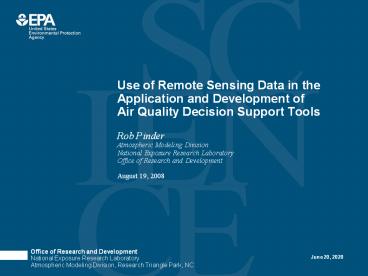Rob Pinder PowerPoint PPT Presentation
Title: Rob Pinder
1
Use of Remote Sensing Data in the Application and
Development of Air Quality Decision Support
Tools
- Rob Pinder
- Atmospheric Modeling Division
- National Exposure Research Laboratory
- Office of Research and Development
- August 19, 2008
2
co-authors contributors
- Sergey Napelenok
- Alice Gilliland
- Randall Martin
- Jim Szykman
- Rich Scheffe
- Brooke Hemming
- Bryan Bloomer
3
objectives
- EPA organization and needs (my perspective)
- Current technical capacity
- Suggestions of how to proceed for GEO-CAPE
4
EPA Organization
- EPA primarily a regulatory agency
- EPA is not monolithic
- Office of Research and Development
- Develop decision support tools (CMAQ)
- Program offices / regional offices are users of
tools - Technology transfer
5
EPA uses modeling tools to devise regulatory
strategies (societal benefit)
observations
observations
models
models
Environmental Health Outcomes
Concentration
Sources
Exposure
If it is a criteria pollutant, EPA must monitor
it What is not measured at the surface?
What are the relative contributions from local,
regional, and global processes?
What are the relevant contributions from
different emission sources?
Hospital records, Species populations
6
Current technical capacity
- How are we using satellite data in our
organization (ORD / AMD)? - Improving decision support tools
- CMAQ
- Emissions Estimates
- Top-down (inverse methods)
- Bottom-up (fires, lightning)
- Meteorology, land use, boundary conditions
- Example assessing the impact of regulated
emission reductions
7
2003 2004 2005
SCIAMACHY
8
2003 2004 2005
SCIAMACHY
9
2003 2004 2005
SCIAMACHY
10
Inverse Modeling to constrain emission inventories
Emissions
CMAQ Air Quality Model
Concentration
Inverse
11
Inverse Kalman Filter using Direct Decoupled
Method (CMAQ-DDM-3D)
P Partial derivative of concentration with
respect to emissions N Noise in observations C
Co-variance
12
Inverse Modeling to constrain emission inventories
Emissions
CMAQ Air Quality Model
Concentration
Inverse
Remote Sensing Data
13
Can we demonstrate an improvement in the
simulation of surface air quality?
14
Suggestions for how to proceed with
GEO-CAPEWhat are our requirements?
- Survey results
- Near continuous
- Sub 1km resolution
- Vertical resolution including the boundary layer
- Aerosols by species
- Need to reach shared understanding about what is
an EPA / NASA priority and what is technically
feasible
15
Suggestions for how to proceed with GEO-CAPE
- Some thoughts about a framework for specific
species - What species are not routinely measured and are
critical to ozone / PM2.5 simulations? - What are the detection limits, precision,
resolution trade-offs? - Needs to be relevant for North American
concentrations in polluted and background
conditions - Species that are both relevant and not routinely
monitored are most useful (e.g. NO2)
16
SO2 INTEX
Large sources of SO2 are measured Need low
detection limits for mobile sources evolution
of plumes
altitude (km)
SO2 (ppt, 25th 75th Quartiles)
17
HCHO INTEX
Good indicator of VOC and radical
chemistry Large concentrations in mixed layer
altitude (km)
HCHO (ppt, 25th 75th Quartiles)
18
Carbon Monoxide INTEX
Longer life-time, need higher precision to
resolve differences Vertical resolution is
valuable as a tracer of combustion
altitude (km)
CO (ppb, 25th 75th Quartiles)
19
Other species?
- Greenhouse gases
- Emerging and are of high importance relative to
mission timeline - Emission estimates are as not well known
- Aerosols
- Ammonia and Nitric Acid
- Not routinely measured
- Difficult surface measurement
- Important to PM2.5 and nutrient deposition to
coastal ecosystems
20
How to work together
- Retrievals use regional model to match spatial
resolution - Validation campaign using aircraft, models,
ground-based, and satellite remote sensing data - Need to have quantitative uncertainty estimates
for retrievals - Consistency / integration with other instruments
21
Summary
- EPA science needs
- Improved inputs to models
- Constraints on emission inventories
- Boundary conditions
- Assessment of model processes
- Current technical competencies
- Users of the data
- Not at a place where we can provide feasible
requirements - Can participate in looking at the trade-offs
- Suggestions of how to proceed for GEO-CAPE
- Work together to develop requirements
- Can we demonstrate an improvement in air quality
simulation?
22
Questions?
23
(No Transcript)
24
(No Transcript)
25
(No Transcript)

